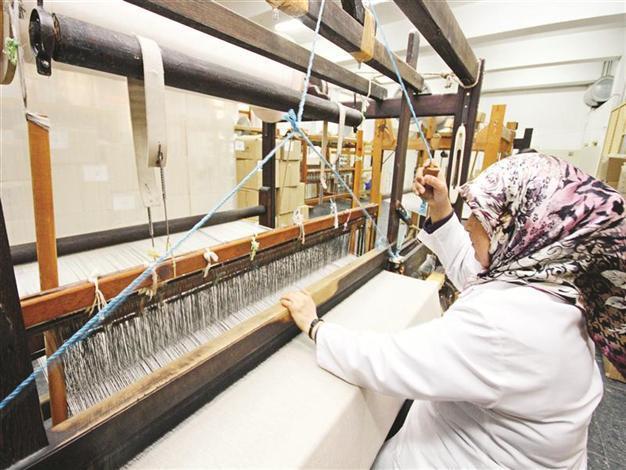History revived with female labor
MUĞLA - Anatolia News Agency

Using regional fabrics, lots of local women are producing various products such as bed sheets and tablecloths on the looms at the MELSA workshops. In this way, they make significant contributions to their families’ income. AA photos
The Muğla Governor’s Office has employed women in workshops established within the body of the Special Provincial Administration. The women in these workshops produce the Aegean city’s unique fabrics and silk handmade weaving, the sales revenue of which is used for the restoration of historical structures in the city as well as social projects.Muğla Governor Fatih Şahin said their goal was to keep one of the city’s cultural values alive with the Muğla Handicrafts Company (MELSA). “We buy abandoned historical houses in Muğla and its vicinity, restore them and make them suitable for cultural tourism,” he said.
According to Şahin, they had been using the resources of MELSA for both cultural and social projects for the last few years as restoration continues on local historical structures.
“With the revenue from MELSA, we have constructed a school in the town of Fethiye. We meet the needs of disabled people. We have bought a house from the Family and Social Policies Directorate and it will serve a social project. We also restore historical structures and present them for cultural tourism. We protect our history and culture by supporting traditional handicrafts,” he said.
Women add to family budget
Several women producing regional fabrics on the looms at the workshops make significant contributions to their families’ income.
MELSA production official Nuray Kuri said 12 women were working in the central workshop. “We have 13 weaving looms in the villages. Home decoration products are produced from 100 percent cotton fabrics. Our products keep warm in winter and cool in summer, thus they are very popular. These fabrics are also used in tablecloth and bed sheet production.”
She said the products are for sale in stores in Muğla and the surrounding tourist districts. “Wholesale is also possible upon the demands of customers in Ankara.”
According to Kuri, loom weaving had not been done in contemporary Muğla before the opening of MELSA. “With the establishment of MELSA in 1995, weaving looms began to operate again. Production increased in the city. The products are more valuable since they are handmade. We also display these products in places we restore. We join fairs in Turkey and abroad to promote our products there.”
Places including Hacı Kadı House, Belen Coffee House, Hacı Şükrü House, Belen Windmill and Osman Hamdi Bey House have so far been restored with the revenue generated by MELSA.
















